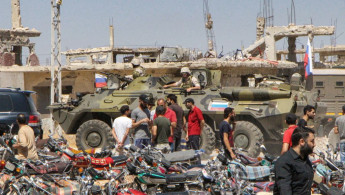Displaced residents return to Daraa Al-Balad as siege is lifted
Residents of Daraa Al-Balad who were displaced by fighting began to return to their homes on Thursday after the Syrian regime reopened roads leading into the city.
Some 35,000 residents of Daraa Al-Balad had been displaced as a result of the roughly month-and-a-half of fighting between regime forces and opposition fighters. Their return marks the end of fighting and the siege of the neighbourhood, which saw government forces prevent goods, services and people from entering the small southern city for over two months.
Most of the displaced families took shelter in mosques and schools in neighbouring cities, where the Syrian Arab Red Crescent (SARC) and regime forces supervised humanitarian relief operations.
Living conditions in the shelters were poor as provisions were scarce and of low quality, a resident of Daraa Al-Balad who was in contact with displaced residents told The New Arab on condition of anonymity. Regime soldiers also regularly verbally abused those families staying in the shelters, according to the resident.
“The families are happy to return, especially after the humiliation they experienced in Daraa Al-Mahata, the security corridor and the displacement shelters,” the resident said. They added that some of the displaced had to endure even worse conditions, forced to sleep on the streets for lack of a better alternative.
Fighting in Daraa Al-Balad finally ended this week after the regime and the central negotiating committee representing the city arrived at a deal.
The deal allowed regime forces to enter the city and operate nine checkpoints in the city alongside the Moscow-aligned Eighth Brigade. In addition, the city’s residents handed over about 100 pieces of weaponry, Mohammed al-Askara, an activist from Daraa Al-Balad told The New Arab.
The regime’s fourth mechanised division, a unit close to Iran and the chief subject of residents’ complaints, also withdrew from the city as the siege was lifted.
The spokesperson for the negotiating committee, Adnan al-Musalameh, congratulated the residents of Daraa Al-Balad for the deal on Thursday, praising them for “standing firm,” and for their “victory”- presumably over regime forces.
Though the negotiating committee did not achieve all of the points it wanted—namely, no checkpoints within Daraa Al-Balad—the final agreement was considerably more measured than most residents were expecting.
“It’s definitely a victory. Our weapons are still with us and we’re still here in our city,” Abu Abdo Musalemo, a resident of Daraa Al-Balad whose refusal to be displaced to northwest Syria allegedly led to the collapse of a previous deal with the regime, told The New Arab.
“It doesn’t look like a victory in the media, but what did the regime gain? A few checkpoints, which we could get rid of in a day,” Musalemo said.
Al-Askara also considered the deal a victory, pointing out that even though residents handed over some weapons - a chief sticking point in previous negotiations - those arms that were surrendered were “practically broken.”
“The [regime’s] army entered the city and did a photoshoot, and then left. In the end, all we wanted is the bombing to stop and blood to stop being spilled,” he said.





 Follow the Middle East's top stories in English at The New Arab on Google News
Follow the Middle East's top stories in English at The New Arab on Google News


